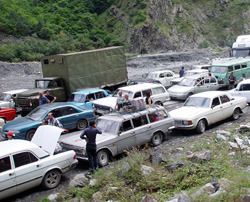“It’s a catastrophe,” said the representative from the “North South Trans” cargo loading company about the critical situation of Armenia’s transportation routes as a result of the Russian-Georgian tense relations. “A day isn’t enough to list all the hardships we face.”
Russian-Georgian relations have been rocky for the past two weeks now after Russia cut off all maritime, air, land and postal communication with Georgia. This means that things are not looking good for Armenia’s cargo transportation, which was already in a bad situation after the closing of the Higher Lars passing point. Currently, producers and cargo loaders say that they spend day and night thinking of ways to get out of the situation at hand and transport their load as soon as possible and safely. The thing is that the Armenian cargo-loaders that relied on the Poti-Novorosisk-Burgas-Poti ferry-boat since June didn’t realize all this time that transporting cargo by Georgian cars can cause problems. During these months, owner of “Tamara Fruits” Boris Hovhannisyan didn’t even think that he could stop working with the Georgian cargo-loaders and export his products through the means of Russian and Armenian cars. “On September 27, the 20 tons of frozen blackberries of “Tamara Fruit” were loaded onto the Georgian ferry-boat and were taken to Poti, then Novorosisk in order to get back to Moscow”. The boat made it to Moscow and that’s when Russia cut off all ties with Georgia. Mr. Hovhannisyan doesn’t know what to do in order to export the cargo. “There are blackberries in there and blackberries rot. If it stays like that for one more week, then I will simply leave the company” said B. Hovhannisyan. “I called our colleague in Moscow and asked him to send a Russian ferry-boat and transport the cargo there. But I don’t know when that will be. In addition, they don’t transfer the money until the products don’t make it safe and sound and the tardiness of that amount hurts company sales. Currently, I have 50 loads of cargo and I don’t know how I’m going to transfer that much.”
Owner of the “Sati” cargo company Makar Arakelyan said that nowadays the number of ferry-boats transporting the cargo is not enough. It’s clear that no cargo is loaded on the Georgian ferry-boats in Armenia. There are problems with the Russian ferry-boats as well. If Russia doesn’t accept the Georgian ferry-boats, the same goes for Georgia. Armenian cargo loaders once again rely on the Armenian ferry-boats, which are few in number. Importers and exporters face the same problems. Their cargo is accumulated in Novorosisk. The thing is that the products exported from Armenia have been accumulated there and still haven’t been brought back to Armenia. Those products couldn’t move from Novorosisk due to the fact that they were loaded on to Georgian ferry-boats. There were many pile-ups here and big lines for getting onto the ferry-boats. B. Hovhannisyan also has importing cargo in Novorosisk. So, it’s possible that his imported and exported products will reach Armenia at the same time. At the moment, B. Hovhannisyan doesn’t know just how much his production will do down as a result of these events.
Due to the Russian-Georgian tense relations, the schedule of ferry-boats is out of order. If the ferry-boat was supposed to leave from Poti to Novorosisk, due to the schedule, it hadn’t even made it to Poti. It’s really hard to talk with importers, exporters and cargo-loaders these days. They are very tense and angry. That’s why the only make a small comment after hearing the question and don’t wish to talk anymore. I understand that because each day that they lose is a loss for them, especially since the Armenian authorities are just following up on the Russian-Georgian conflict. The authorities don’t care if the product exported from Armenia is in poor condition, or if the producer suffers losses every day. Producers are forced to solve their problems on their own.
Armenian poultry-producers have tried to find some way out of this situation with the bird feed; although late, however they have managed to transport. The blockade hasn’t really affected importers from European countries. “We import construction materials from Germany, Holland,” says director of “Euroconstruction radio technology” INC Yeghishe Harutyunyan. “The products that we have purchased from those countries have made it safe and sound to Armenia. We stopped importing from Russia because we realized that it’s difficult.” As for the importers from Russia and the CIS countries, they rely on the work being done by the Armenian delegation of the Economic Cooperation intergovernmental committee. The 8th session of the Russian-Armenian Economic Cooperation intergovernmental committee took place in Moscow and the two countries discussed issues concerning trade, transportation and communication. The Armenian committee members need to explain to the Russians that the relations with Georgia mustn’t reflect upon the relations with Russia’s strategic ally Armenia. Armenia must once again try to make the Russian authorities understand that currently, Armenia is facing many hardships what with the transport of cargo. It’s hard to say whether or not Russia will understand, or have the desire to understand the problems that its strategic ally faces. It’s even harder to foretell whether Russia will solve all the problems with cargo for Armenia, or it can’t do that due to its state interests. No matter what they say, the Armenian authorities will go along with anything.

